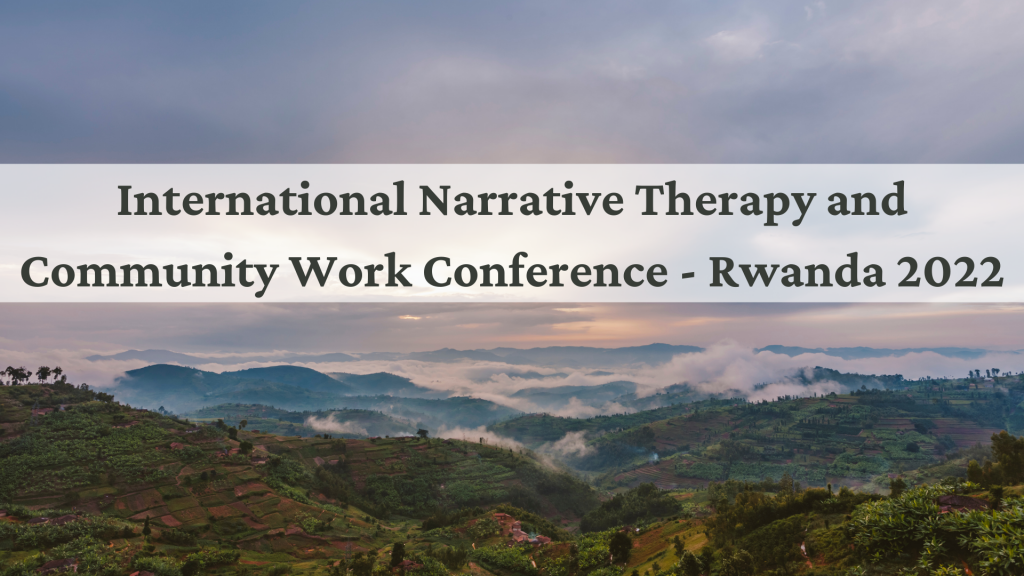
The conference went so well! Videos, stories and songs will be shared soon.

Our recent international narrative therapy and community work conference took place in Rwanda – the land of a thousand hills – in collaboration with SOS Rwanda and the University of Rwanda.
There is a significant history of Rwandan practitioners making contributions to the field of narrative practice. Practitioners from Ibuka (the Rwandan national genocide survivors association) began engaging with narrative therapy and community work ideas over ten years ago. Their work is featured in ‘Working with memory in the shadow of genocide‘
This conference featured the diverse work of Rwandan practitioners with children and families and from narrative therapists and community workers from many different parts of the world including: Rwanda, Uganda, Tanzania, Ethiopia, Burundi, Kenya, Somalia, Eritrea, Australia, Israel, South Africa, Canada, Somaliland, Belgium, Netherlands, India, Norway, UK, USA, Turkey, Hong Kong, Kurdistan (Iraq), Nepal & Brazil.
The conference went better than we could ever have hoped! In coming months we will be creating a virtual version of the conference. We hope you can be part of this.
About the conference
This conference will feature presentations from well-respected international narrative therapists and Rwandan and East African practitioners on the following themes:
- Street children and vulnerable children: Hopeful stories of practice
- Narrative family therapy
- Intergenerational narrative practice in relation to intergenerational trauma – explorations by Jewish narrative practitioners with reflections from Rwandan colleagues.
- Workshops on the Tree of Life approach which enables children and young people to address traumatic experiences without having to speak about them directly, but instead through the metaphors of trees, forests and storms.
- Presentations by peer mental health workers about how narrative practice can support peer work.
- Workshops describing how narrative practices are being contextualised and used in culturally appropriate ways in Rwanda in relation to disability
- The Team of Life narrative approach which uses sporting metaphors to enable young people to address traumatic experience. This approach, originally developed for a Ugandan context, is used by Rwandan colleagues with children who have lived on the streets and children and young people struggling with their mental health.
- Strengthening resistance and resilience: The use of narrative practices in working with genocide survivors
- Narrative practice and mental health
- Narrative therapy and Christianity: How narrative practice and spirituality can work together in culturally relevant ways in African contexts.
- Indigenous research and narrative practice
- Working with memory: Narrative therapy responses to diverse experiences of trauma
- Aboriginal narrative practice – and exchanges between different peoples who have survived genocide
- Saying hullo again, re-membering, narrative grief work in counselling and community work
- Creative examples of narrative therapy documentation – including letters, certificates and songs!
- Where is the conference being held?
The conference is being held at the Lemigo Hotel: https://www.lemigohotel.com/ [Please note, if you wish to stay at the Lemigo Hotel it’s better to book directly via: Nadia Kabirigi, Assistant Front Office Manager, Lemigo Hotel, Phone: (+250) 782 597 179 / (+250) 784 040 924, Email: [email protected] - What airport do I fly into?
The Kigali International Airport. - Do you have any information re tips re safety in Kigali and Rwanda?
This website seems to offer some helpful information: https://www.euronews.com/travel/2022/01/24/rwanda-the-6th-safest-country-for-solo-travellers-new-survey-finds - Transportation ideas to/from the airport and to the conference venue
There is a free shuttle from airport to the Lemigo Hotel (if you are staying at the hotel). - Can we receive an invitation letter to show at the airport?
Yes. We are happy to send you an invitation letter that you can show upon arrival! - What are the current COVID isolation requirements upon arriving in Kigali? And what COVID precautions will the conference be taking?
The reason we are able to go ahead with the conference in August is because of the diligence and seriousness with which Rwandan health system takes COVID-19 and their success at containing the pandemic. We will be working closely with health officials to ensure a COVID safe event. All conference participants are required to be vaccinated and a negative COVID test is required no more than 72 hours prior to attending the conference. Masks are required in the conference venue. Rapid covid-19 testing options will be available at the hotel on the first day of the conference. We will be prioritising hygiene, social distancing and ventilation. - Who can attend this conference? Is it only for narrative practitioners?
You do not have to be a narrative practitioner to attend the conference … you only need to have an interest in narrative therapy and community work! There will be both introductory and advanced workshops during the five days. - For people who won’t be able to attend the conference in Rwanda, is there any link that we could join through zoom?
The conference will be a face-to-face event only. We have been longing for a chance to meet together in the same place! And it will also be lovely to be free for a while from screens and internet connections. So there will not be an opportunity for people to zoom in during the days of the conference. However, we do have a plan for those who would love to attend but cannot.
We are going to do good quality video recordings during the event … and then sometime later (we’ll need a few months to edit the footage) we will hold an online event. People can watch the recordings and then come online to ask questions to the Rwandan presenters. We will ask people who want to participate in this way to sponsor a local Rwandan to attend the conference … and then, in exchange, they will be able to be part of the online event. The first person to take this up has been Fariba Ahmadi, an Afghani colleague who now lives in Adelaide. Fariba so wanted to come and be part of the conference and also support Rwandan practitioners that this whole idea came out of conversations with her. If you know anyone who you think would be interested in being involved in the conference this way, please ask them to email Charlotte at [email protected] - Will there be any organised trips outside of Kigali?
If you wish to organise trips outside Kigali we recommend you contact Claudien Nsabagasani and his company, Birding and Educational Tours Rwanda, which runs many different tours experiences.
However, for individuals or groups who would like to visit psychosocial and mental health related community projects and others, we recommend to reach out to Geruka Healing Centre, an independent centre in Rwanda and they can help in advising and recommending community projects to pay a visit both in Kigali or outside Kigali. - Can you give us more information on the conference structure and presentations?
A draft program will be available soon! There will be a welcome event on the afternoon of Sunday 7th August. The Monday and Tuesday will feature pre-conference half-day and all-day workshops. The 3-day conference will formally open on Wednesday morning and run from Wednesday-Friday (10-12th August). It will include a series of keynotes (delivered in partnerships – always featuring both Rwandan/African and international presenters) and workshop sessions in which there will always be a choice between presenters from Africa and presenters from other continents. There will also be an emphasis on artistic practice (including song). Hopeful narrative responses to profound suffering (individual and collective) will be shared. Because this conference is a collaboration with SOS Children’s Villages Rwanda there will be many presentations in relation to work with children, young people and reintegration with families and communities. Collaborations with Opramamer (a significant national peer mental health network) will also be featured. It’s going to be a vibrant week!
You can find this information collated as a PDF here. This document also includes additional information about Rwanda’s COVID guidelines, which we will update as new information is made available.
Helpful websites
The official tourism website Visit Rwanda is full of tips about travelling to the ‘heart of Africa’.
For information about tourism in Rwanda, please click here and for any support and local advice, reach out to Claudien Nsabagasani and his company, Birding and Educational Tours Rwanda, which runs many different tours experiences.
Living in Kigali is a website is full of helpful tips about the different neighbourhoods in Kigali.
For all COVID-19 related information, see Rwanda Biomedical Centre’s website.
Our conferences are organised as ‘community events’ that seek to be congruent with the key principles of narrative practice. Some of our aims include:
- To provide high quality presentations on the latest thinking and application of narrative ideas and to do so in ways that enable people of differing experience to be both engaged and challenged
- To enable people of different cultures, countries, genders, ages, class backgrounds, physical abilities, and sexual identities to come together, enjoy each other’s company, and have a sense that the conference program and processes include their perspectives, hopes, and ideas
- To use the conference as a chance to acknowledge and come to terms with the history of the land on which it is held
- To create an atmosphere that is non-hierarchical, with no pronounced difference between presenters and participants
- To provide a forum for conversations that are expanding the field (not confirming it or simply reiterating what is already known).
Cancellation policy
- Due to the unusual circumstances of the pandemic we will offer a full refund up until the 5th of July, 2022 (minus USD$50 admin fee and any associated transfer fees)
- A refund of 50% of your registration fee (minus USD$50 admin fee and transfer fees) is available until the 19th of July (Australian time). No refund will be offered for cancellationsafter this date.
Disclaimer
As conference organisers we are not in any way responsible for air fares, travel expenses, accommodation, meals or any other associated expenses which you may have in relation to attending the conference. We strongly recommend that, at the time of booking, you purchase a comprehensive travel insurance policy of your choice. Dulwich Centre Foundation does not accept any liability of whatever nature for the acts, omissions, or default whether negligent or otherwise, of any service providers in connection with travel, accommodation, catering and other associated arrangements for your attendance at the conference. You should ensure that you comply with any health or visa requirements applicable to your attendance at the conference, including being vaccinated against COVID-19. You are responsible for entry, exit, health and other documents required by your country of origin or the countries you are visiting or transiting. Dulwich Centre Foundation will not be liable in contract, in tort (actionable wrong) or otherwise for any injury, damage, loss, delay, additional expenses or inconvenience caused directly or indirectly by any events which are beyond our control, including, but not limited to, war, acts of terrorism, civil disturbance, fire, floods, acts of God, acts of Government or of any other authorities, accident to or failure of machinery or equipment or industrial action, or acts of third parties generally. Events beyond the control of Foundation grant the right to cancel the event without being held liable for compensation.